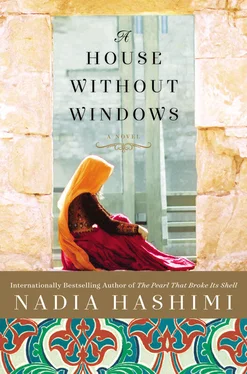“I. . I don’t know who can confirm it. As I said, it was about four months ago in the market and I cannot recall who I heard this from, though I do believe it was more than one person who shared this story with me. I went home that day having forgotten what I’d gone to purchase — that’s how upset I was by what I’d heard.”
“Who wouldn’t be?” Hakimi had his elbows on the desk now. He was fidgeting, his arms and legs trying to find a position that made sense when the information didn’t. A thought suddenly occurred to him. “Did his wife know about this?”
“His wife?” Timur shrugged weakly. “I don’t know. I suppose she could have known. She might have even seen him do it. How disgraceful it must have been for her and her children. For their sake, I’m glad the whole town didn’t hear about it.”
“This is bad. This is very bad.”
Such blasphemy was not tolerated in Afghanistan. Both men were thinking of the young woman who had, only eighteen months prior, been accused of setting aflame a page of the Qur’an in a Kabul mosque. A single accusing finger had ignited a frenzied mob of mostly men, who viciously attacked her with beams of wood, rocks the size of watermelons, and angry boots. They drove a car over her body before throwing her into a dry riverbed and torching her remains. Immediately after, an investigation was launched. The purpose of the investigation — to determine whether the woman had indeed burned a page of the holy book.
The accusation proved to be a false one and the men who were arrested and convicted of murder were, over months, quietly released or had their sentences dramatically reduced. The results were clear. There was excusability for those who took on blasphemers and defended the Qur’an. Was it possible that Zeba had been angered by her husband’s actions? Hakimi had heard much about Kamal’s love for the drink. It wasn’t that common in their town, but a few men had fallen for the bottle. It was a sin, no doubt, but one that paled in comparison to this new accusation. What kind of man had Kamal really been?
“This is terrible news. I understand your hesitation in coming forward with this. I don’t think we should say a word about it to anyone else, though. It could make a lot of people angry, including the family of the deceased.”
Timur shifted in his chair.
“I wouldn’t want to upset them further, but don’t you think that the judge should know? It’s possible his wife. . I mean, I can’t say for sure, but isn’t it possible that she knew about this and. .”
“Possible, yes. But let’s leave her fate to the court.” This was more than Hakimi wanted to handle. He shook his head, reassuring himself that he was making the right decision. “We cannot risk the reaction to this rumor. And it is only a rumor, right?”
“I suppose it is only a rumor. Though I heard it from more than one person.”
“You said that already.”
“Of course I did,” Timur said through a parched mouth. “I’m sorry. I just find it hard to let something like this be — as a Muslim. I felt like I had a duty to say something. Someone who stands up against a crime so terrible should be respected in this life as well as the next, I think.”
Hakimi said nothing. He contemplated Timur’s words. “I. . I understand completely. I feel the same responsibility. I suppose I could get a message to the judge quietly.”
“I leave it to your judgment,” Timur said deferentially. “I’m thankful the responsibility for this doesn’t rest on my shoulders.”
Hakimi let out a sigh and glanced around the small police station under his watch. It was true, he thought, that no one in this town fully understood the burden of his position.
“I’ve taken enough of your time, Hakimi- sahib . But I do have a question if you don’t mind. What about the woman. . his wife. Have others mentioned noticing any odd behavior? I was just wondering if I was the only one who’d seen it.”
“Not at all,” Hakimi chuckled, relieved to have moved on to lighter details. “You’re the fifth person to come forward in the last week. I suppose it all makes sense. The woman must have been a lunatic to drive a hatchet into her husband’s head. The poor guy, Allah rest his soul. I wonder if he knew what kind of crazy his wife was or if she just snuck up on him. Women are odd creatures, you know. Awfully good at hiding things. You just never know what they’ve got tucked in the folds of their skirts. That’s what my father told me.”
Timur smiled politely, relieved to hear others had come forward before him, just as Walid had promised.
“Yes,” he said, nodding in agreement as he pushed his chair back and pulled down the ends of his linen vest. This would be the first good piece of news to cross their threshold in a long time. That they’d survived this long after what had happened to Laylee was all because Zeba had kept Laylee’s secret. Nargis reminded Timur each time he’d changed his mind about coming forward with this story about seeing Zeba eat dirt. “They certainly are surprising creatures.”
Timur’s heart pounded as he walked home, unsure if there was wisdom in heeding the entreaties of a broken girl and her mother.
“ZEBA! ZEBA!”
It was a trick of slumber, she thought, to hear her mother calling her in this place. Her head felt lighter than it had the first few nights.
“I’m looking for my daughter!”
Zeba sat up with a gasp. She looked down and realized a small, round pillow had been tucked under her head. Had the mullah placed it there while she slept? She shuddered to think his hands had lifted her head to slide it beneath her. How could she not have waken to the touch of a stranger?
“Is there anyone here?”
Zeba crawled to the mouth of her cell no differently, she thought briefly, than the way Rima would crawl to her.
“Here! I’m here, Madar!” she shouted timidly. It was the first time she’d raised her voice above a whisper in this cell. She knew the others would be riled to hear her, a woman, but to answer her mother’s call was an irresistible instinct.
“Zeba? Is that you?”
Zeba craned her neck past the lip of her cell. There were two men in the center yard looking curiously toward the shrine and the mullah’s quarters. Local devotees would go directly to the shrine, steering clear of the valley of the insane.
Zeba waved her arm, squinting against the sunlight that stung her retinas.
“Here! Madar- jan, I’m here!”
By the shift in her mother’s posture, she could see that she’d caught her attention. Her mother started toward her with a brisk pace. When the voices began to call out, Zeba’s stomach reeled.
“Madar? Is that you, Madar?” shouted one wisp of a man. His voice cracked as he yelled toward Gulnaz. “Have you come for me after all this time?”
“She’s not just your mother. She’s here for all of us. She’s come to take care of us,” cried another man in joy.
“Fools!” called a third morosely. “A desperate man can see the ocean in the desert.”
Gulnaz ignored them all and stayed clear of their cells, her face stern as she neared the last vault — the one that contained her daughter.
“Who are these women?” A chain rattled, but the moan remained faceless.
Zeba saw the mullah burst through the doors of his quarters with his son at his side. Though she couldn’t make out the expression on his face, he looked flummoxed. He nudged the boy back into the building and watched without moving, as if an invisible chain tethered him to his house.
“Zeba, are you all right? What have they done to you? Dear Allah, look at this place!” Gulnaz had crawled into the cell without a second’s thought. She threw her arms around her daughter then drew back, patting down the frazzled puffs of hair that hid her face.
Читать дальше











